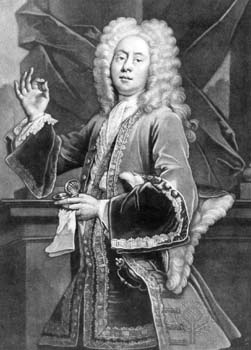“A weak invention of the enemy.”
Act V, scene 3. Similar thought in William Shakespeare, King Richard III.
Richard III (altered) (1700)
Colley Cibber fue un actor, dramaturgo y poeta inglés. Fue el primer actor que realizó también trabajos de dirección lo que estableció su importancia en la historia del teatro. Además, su libro de memorias Apology for the Life of Colley Cibber aporta una información muy valiosas sobre el teatro londinense de la época; las dos comedias que escribió reflejan los cambios culturales e ideológicos de principios del siglo XVIII.
Cibber escribió algunas piezas teatrales para que fueran representadas por su propia compañía en el teatro de Drury Lane y adaptó muchas más. Su trabajo recibió críticas negativas de gente de la talla de Alexander Pope. Se veía a sí mismo como el mejor actor del momento y, a pesar de sus esfuerzos por interpretar personajes dramáticos, fue ridiculizado constantemente; consiguió finalmente el éxito interpretando papeles cómicos.
Sus contemporáneos consideraban que Cibber tenía poco gusto en sus producciones teatrales y una pobre visión empresarial. El oportunismo social y político le permitió ganar el premio de poeta laureado pasando por encima de otros autores mucho mejores. A pesar del premio, los estudiosos actuales consideran que sus poemas tienen poco interés. Además, la personalidad extravertida de Cibber ofendió a muchos y la fama le llegó gracias a ser el blanco del poema satírico The Dunciad de Alexander Pope.
Wikipedia

“A weak invention of the enemy.”
Act V, scene 3. Similar thought in William Shakespeare, King Richard III.
Richard III (altered) (1700)
“Oh, how many torments lie in the small circle of a wedding ring!”
The Double Gallant, Act I, sc. ii (1707).
“The aspiring youth that fired the Ephesian dome
Outlives in fame the pious fool that rais'd it.”
Act III, scene 1. Similar thought by Sir Thomas Browne.
Richard III (altered) (1700)
“As good be out of the world as out of the fashion.”
Love's Last Shift, Act II (1696).
Love's Last Shift, Act IV (1696). Compare: "Heav'n has no Rage, like Love to Hatred turn'd,
Nor Hell a Fury, like a Woman scorn'd", William Congreve, The Mourning Bride (1697), Act III, scene viii (often paraphrased: "Hell hath no fury like a woman scorned").
“Now, by St. Paul, the work goes bravely on.”
Act III, scene 1.
Richard III (altered) (1700)
The Careless Husband (1704), Act ii, scene 2.
“And the ripe harvest of the new-mown hay
Gives it a sweet and wholesome odour.”
Act V, scene 3.
Richard III (altered) (1700)
“Prithee don’t screw your wit beyond the compass of good manners.”
Love's Last Shift, Act II, sc. i (1696).
“With clink of hammers closing rivets up.”
Act V, scene 3. Similar thought in William Shakespeare, King Henry V.
Richard III (altered) (1700)
“Persuasion tips his tongue whene'er he talks,
And he has chambers in King's Bench walks.”
A parody on Pope's lines: "Graced as thou art with all the power of words, / So known, so honoured at the House of Lords"; reported in Bartlett's Familiar Quotations, 10th ed. (1919).
“Off with his head—; so much for Buckingham.”
Act IV, scene 3.
Richard III (altered) (1700)
The Lady's Last Stake (1707), Act I, sc. i.
“Old houses mended,
Cost little less than new before they're ended.”
The Double Gallant, prologue (1707).